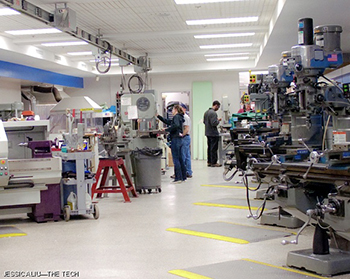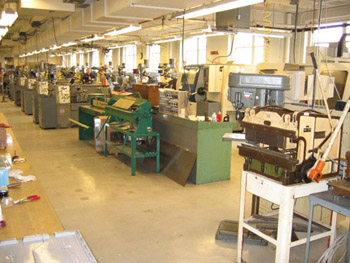Contents
- Intro
- Pappalardo
- Hobby Shop
- Edgerton Student Shop
- MIT Museum
- MITERS
- EVT
- SEVT
- RoboCup
- VDS
- FSAE
- Architecture
- LMP
- Dorms
- Labs
Intro
There are many places at MIT where you can make cool stuff. However, not all shops are created equal. There are some that were intended for a specific purpose; they all have advantages and disadvantages. Based on my experience, I want to showcase the advantages and disadvantages of each shop. I want to tell you all about these characteristics to make your next project an efficient one.
Pappalardo
 Pappalardo is a machine shop at MIT that MechEs can be quite familiar with. Pappalardo covers several project classes at MIT: 2.009 in the fall, 2.670 in IAP, 2.007 in the spring, and WTP in the summer. Also, there are various banquets and award ceremonies that are held throughout the year, making Pappalardo pretty much busy all year round. It's a great shop with nice tools, but it isn't for personal projects, only for class related stuff.
Pappalardo is a machine shop at MIT that MechEs can be quite familiar with. Pappalardo covers several project classes at MIT: 2.009 in the fall, 2.670 in IAP, 2.007 in the spring, and WTP in the summer. Also, there are various banquets and award ceremonies that are held throughout the year, making Pappalardo pretty much busy all year round. It's a great shop with nice tools, but it isn't for personal projects, only for class related stuff.
Hobby Shop
 The Hobby Shop is a machine shop at MIT that is devoted to personal projects. The tools in the shop are, on average, a bit older and less organized for the most part when compared to other shops. The one big advantage is that it is basically the only woodshop on campus. There are other woodshops, but they are for architecture students. There are awesome projects that come out of the Hobby Shop all of the time. If you know how to use older tools, it's a great resource.
The Hobby Shop is a machine shop at MIT that is devoted to personal projects. The tools in the shop are, on average, a bit older and less organized for the most part when compared to other shops. The one big advantage is that it is basically the only woodshop on campus. There are other woodshops, but they are for architecture students. There are awesome projects that come out of the Hobby Shop all of the time. If you know how to use older tools, it's a great resource.
LMP: The Laboratory for Manufacturing and Productivity
 LMP is a great machine shop at MIT with a focus on production. They have some of the highest quality and most sophisticated machines on campus. The technical instructors were industry machinists with a wide variety of knowledge and skills.
LMP is a great machine shop at MIT with a focus on production. They have some of the highest quality and most sophisticated machines on campus. The technical instructors were industry machinists with a wide variety of knowledge and skills.
Edgerton Student Shop
 The Edgerton Student Shop, not to be confused with the Edgerton Center, is a nice middle ground between the Hobby Shop and LMP. It has the nice tools and machines that are well organized like LMP, but with the freedom to work on personal projects like the Hobby Shop.
It has 4 mills and 4 lathes
The Edgerton Student Shop, not to be confused with the Edgerton Center, is a nice middle ground between the Hobby Shop and LMP. It has the nice tools and machines that are well organized like LMP, but with the freedom to work on personal projects like the Hobby Shop.
It has 4 mills and 4 lathes
MIT Museum (N51 / N52)
The back of the MIT Museum is a host to a number of clubs and organizations that make cool stuff.
MITERS
The MIT Electronic Research Society (MITERS) is a group that is famous for being a hackerspace.
EVT
The MIT Electric Vehicle Team does cool stuff with battery powered vehicles, a bit more legit than MITERS...
SEVT
The Solar Electric Vehicle Team does cool stuff with molds and solar panels.
RoboCup
RoboCup makes small robots that play soccer.
VDS
Vehicle Design Summit doesn't really do much, but they have a lot of money.
FSAE
Formula Society for Automotive Engineers (FSAE) focuses on vehicle design for racing.
Architecture
Architecture students also work in the space.
Dorms
There are several dorms on campus that allow machine shop use, including Random Hall, East Campus, and Simmons Hall. At first, I really wanted a machine shop in my dorm, but I later realized that it wasn't necessary. The tiny machine shops that are in the basement of these buildings have small, weak tools that aren't really meant for producing anything that is high quality. They are mostly good for hacking something together at the last minute for a project class like MASLAB or something. I just organize my schedule so that I get stuff done during the day and sleep at night. There is no need for me to have a machine shop at home.
Labs
There are a lot of labs on campus that have their own machine shops. For example, my lab has a CNC Mill, a CNC Lathe, a 3D Printer, a bandsaw, and a drill press. Perhaps the most elaborate shop is in the Bioinstrumentation Lab, run by Professor Ian Hunter. There is also the CSAIL machine shop.